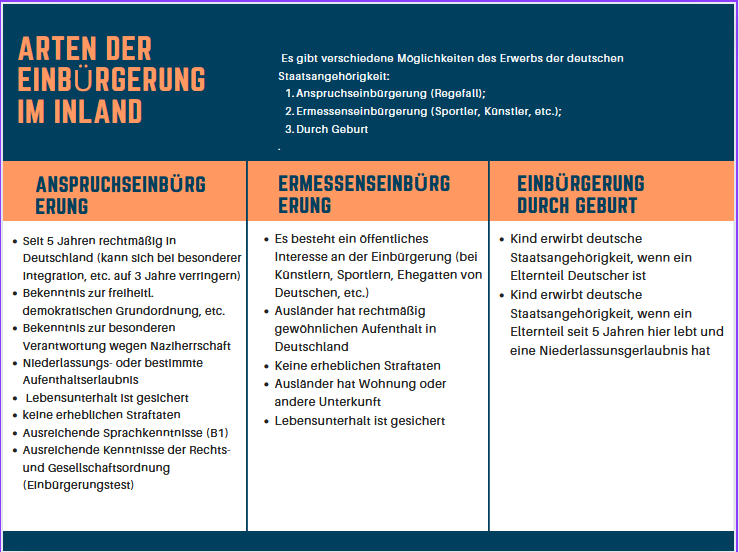What exactly does the new Naturalisation Act entail? What consequences, changes and advantages does it bring? Below you will find an overview and an explanation of the new law, listing the changes in detail and comparing them with the old rules.

Background:
A considerable proportion of the German population does not have a German passport. Although many people would be legally entitled to naturalisation, only a small proportion manage to obtain German citizenship. With a naturalisation rate of just 1.1 percent, Germany is well below the EU average of 2.0 percent. In 2022, only 168,545 people applied for a German passport, which corresponds to around 3 per cent of foreign citizens who have lived in Germany for at least ten years. These figures make it clear that the current citizenship law in its current form is not sufficient to adequately support people with a migration background and offer them long-term integration and future prospects. A new law has been passed to improve this situation.
The requirements for acquiring German citizenship and naturalisation are regulated in the Citizenship Act (StAG), which comprises 42 paragraphs and covers topics such as length of residence, marriage, origin, flight and citizenship equalisation. The most recent amendments relate in particular to sections 4 and 10 of the StAG. These reforms entail significant adjustments that present both opportunities and challenges for those seeking naturalisation.
Legislative procedure
On 19 January 2024, the Bundestag passed the "Act on the Modernisation of Citizenship Law (StARModG)". 382 MPs voted in favour, 234 against and 23 abstained. The law was published in the Federal Law Gazette on 26 March 2024 and comes into force on 26 June 2024.
Purpose of the law
The primary aim of the new law is to facilitate access to German citizenship for foreigners living in Germany on a long-term basis and to offer them better prospects for their future. In addition, the law is intended to make Germany more attractive as a location for highly qualified specialists by simplifying the acquisition of citizenship.
However, the reform is not only aimed at a quantitative increase in naturalisations, but also places greater emphasis on integration achievements and values such as a commitment to the basic democratic order. The law thus combines the promotion of integration with higher requirements for responsibility and independence.
Overloading the naturalisation authorities
Although the new law lowers the legal hurdles for naturalisation, naturalisation applicants face another major obstacle: the overburdened naturalisation authorities. Many offices are severely understaffed, which means that naturalisation procedures often take months or even years.
The number of naturalisation applications has risen continuously in recent years, while the authorities' personnel resources have not been increased to the same extent. Experts criticise the fact that this overload not only makes integration more difficult, but also reduces trust in the administration. For many applicants, the long waiting time is a frustrating hurdle that contradicts the aims of the new law. Although the federal government has announced that it will provide additional funding and staff, in practice, implementation remains slow in many places. If the naturalisation process takes too long, you can Action for failure to act to the competent administrative court.
Changes at a glance
1. Authorisation of dual citizenship
New regulation (from 26 June 2024):
The new law basically allows people to retain their previous citizenship. People who are naturalised no longer have to renounce their previous citizenship. Dual citizenship is therefore possible for all those wishing to naturalise.
Old regulation:
Previously, the Nationality Act aimed to avoid multiple nationalities. As a rule, naturalisation required the renunciation of the previous nationality. However, there were exceptions, for example for EU citizens, Swiss nationals and people from countries that did not allow the loss of original citizenship (e.g. Iran). Despite these exceptions, most applicants had to give up their previous citizenship.
Special feature:
Some countries such as China, India or Japan do not recognise dual nationality, which means that citizens of these countries may lose their original citizenship if they take German citizenship.
2. Earlier naturalisation possible
New regulation (from 26 June 2024):
The minimum period of residence for naturalisation has been reduced from eight to five years. Naturalisation is even possible after three years if special integration achievements such as voluntary work, professional qualifications or German language skills at C1 level are demonstrated.
Old regulation:
Previously, naturalisation was possible after eight years of legal residence. The period of residence could be shortened under certain conditions: After participation in an integration course to seven years or in exceptional cases to six years (e.g. in the case of outstanding achievements or German language skills at level B2).
Special feature:
Participation in an integration course no longer automatically shortens the duration of residence under the new law.
3. Relief for children born in Germany
New regulation (from 26 June 2024):
Children born in Germany automatically receive German citizenship if at least one parent has been living legally in Germany for five years and has a permanent residence permit.
Old regulation:
Before the reform, parents had to have lived legally in Germany for at least eight years and have a permanent residence permit for their children born in Germany to automatically receive German citizenship.
4. Relief for the guest worker generation
New regulation (from 26 June 2024):
The requirements for members of the so-called guest worker generation will be significantly eased. A naturalisation test is no longer required and language skills only need to be proven orally.
Old regulation:
Previously, members of this generation also had to prove their language skills both orally and in writing and pass a naturalisation test.
5. Commitment to the Basic Law and German history
New regulation (from 26 June 2024):
In addition to the previous commitment to the free democratic basic order, it is required to recognise Germany's special historical responsibility for the National Socialist reign of injustice. Anti-Semitic, racist or inhuman attitudes preclude naturalisation.
Old regulation:
Previously, only a commitment to the free and democratic basic order of the Basic Law was required.
6. Securing your livelihood
New regulation (from 26 June 2024):
The livelihood must be secured completely without state support. Exceptions have been severely restricted.
Old regulation:
Although applicants had to prove that they were able to secure their livelihood independently, the receipt of social benefits was not automatically a criterion for exclusion if the need for assistance was not their fault.
Special feature:
There are a few exceptions, for example for people who have been employed full-time for at least 20 months in the last two years.
Documents required for naturalisation:
- Completed application for naturalisation
- Valid identity documents (passport or identity card)
- Biometric passport photo
- Proof of legal residence (residence permit)
- Proof of secure livelihood (payslips, employment contracts, bank statements)
- Language certificate (at least B1)
- Naturalisation test or proof that this is not required
- Proof of integration and value (e.g. voluntary work)
The exact requirements may vary depending on the individual situation. It is recommended that you check with the relevant naturalisation authority to ensure that you have all the necessary documents.
The reform of the Citizenship Act aims to facilitate the integration of migrants and at the same time strengthen Germany as a country of immigration. Nevertheless, challenges remain, in particular due to overburdened authorities and the strict requirements for financial independence. These aspects could influence the success of the law in practice.

Brief summary:
Authorisation of dual citizenshipThe possibility of retaining the previous nationality is made possible for all those wishing to naturalise.
Facilitating the acquisition of German citizenshipThe minimum period of residence for naturalisation has been shortened and special proof of integration can lead to earlier naturalisation.
Relief for children born in Germany to foreign parentsThe requirements for acquiring German citizenship at birth have been relaxed.
Relief for the guest worker generationPeople who have lived in Germany for decades have easier access conditions for naturalisation.
Commitment to the Basic LawA commitment to the free democratic basic order and to Germany's historical responsibility is required for naturalisation.
Securing your livelihoodNaturalisation is made more difficult because you have to be able to support yourself without state support. However, there are some exceptions for certain groups of people.
Important Note: The content of this article has been prepared to the best of our knowledge and belief. However, due to the complexity and constant evolution of the subject matter, we must exclude liability and warranty. Important Notice: The content of this article has been created to the best of our knowledge and understanding. However, due to the complexity and constant changes in the subject matter, we must exclude any liability and warranty.
If you need legal advice, please feel free to call us at 0221 - 80187670 or send us an email at or send an email to info@mth-partner.de info@mth-partner.de
Lawyers in Cologne advise and represent clients nationwide in immigration law.




